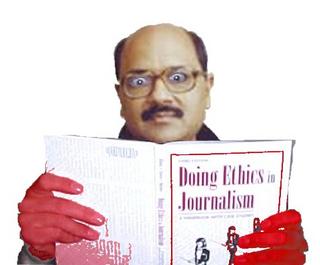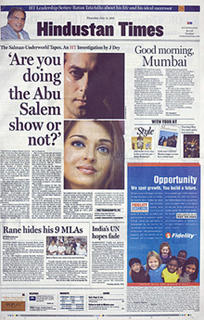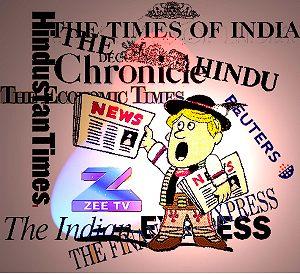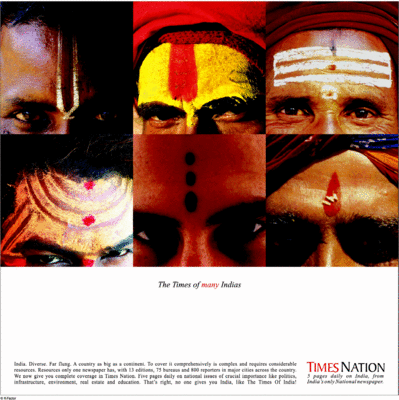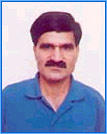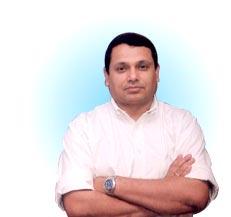Ifthikar Geelani was falsely accused of espionage andjailed. What followed was a media-led witch hunt and aKafkaesque trial, as he reveals in this interview withN P Chekkutty.
Ifthikar Geelani's book, My Days in Prison, releasedin Delhi earlier this year, has entered its thirdprint. It is widely described as a book which destroysthe media's comfortable complacency about the values of our democratic political system. Geelani, a youngjournalist working as the New Delhi bureau chief ofKashmir Times, a highly respected newspaper fromSrinagar, was arrested by the Delhi police on chargesof spying for the ISI, the Pakistani intelligenceagency. Geelani was kept in jail for seven months withoutbail, and the only proof produced against him was acopy of an old academic document about the presence ofIndian troops in the Valley, prepared by an Islamabadthink tank, which was found on the journalist's homecomputer. He was arrested and charged under theOfficial Secrets Act 1923, a much misused piece oflegislation. Geelani's arrest evoked serious protests and theNational Democratic Alliance Government led by A BVajpayee had to finally release the journalist afterunconditionally withdrawing the case it had filedagainst him in the metropolitan magistrate's court inDelhi, when it failed to muster any evidence againsthim.His arrest on a hot summer day in June 2002 and theeventual release on a cold winter evening in January2003 and the chilling experiences he had to face inthe police lock-up, the court-rooms and in Tihar Jail are described in the book which has already beentranslated into Malayalam.A Hindi translation is now in the pipeline. Geelani was in Kerala recently for the release of theMalayalam translation of the book, and he spoke atlength on the book, the case and the role the mediaplayed in the entire episode.
Q: Tell me about your background. How did you happento come to journalism?I was born in Sopore in the Kashmir valley and came toDelhi after graduation from the Kashmir University anddid my journalism course at the Indian Institute ofMass Communication(IIMC). Then I worked for variouspublications and feature services for some time; I wastaken into the staff of The Pioneer when Vinod Mehtawas editor there. During my Pioneer days I went toBangalore for the SAARC meet where I met theeditor of the Pakistani newspaper, The Nation, and Iworked as their correspondent in New Delhi. Inbetween, I worked with Indian Express in Chandigarhand later came back to Delhi and joined Kashmir Timeswhere I work now.
Q: You have been based in Delhi as a journalist forover a decade and you are known in the media circlesthere. But then what actually led to your arrest andincarceration?I think a number of factors contributed to my arrestand harassment. First, I was a Kashmiri and I happened to be theson-in-law of Syed Ali Shah Geelani who is a seniorleader of the Hurriyat Conference. They decided thattargeting me would put pressure on Geelani and theyknew this to be a surefire method as they hadsuccessfully tested it in the case of some otherleaders there. The second factor was that my newspaper, KashmirTimes, was not in the good books of the establishmentand our editor Mr. Ved Bhasin had to face threats fromthe Intelligence Bureau for his bold stand. In fact,our paper was responsible for the media campaign thatresulted in the dismissal of the Farooq AbdullahGovernment in 1983. The IB had reasons to feel unhappy with us because wehad carried a number of stories that exposed theirwrongdoings. Some of these stories had created seriousproblems for them. I think all these things made methe target of their schemes.
Q: Did the Geelani connection put you under anypressure in your professional duties as a journalistin Delhi?Never. In fact, not even my close friends knew that Iwas his son-in-law until I was arrested. I keep myfamily out of my job. I am a professional and I insiston objectivity in my reports. Perhaps that iswhy the entire national media stood by me in the daysof my difficulties.
Q: How do you look at the media coverage of yourarrest, because you say in your book that most of thereports in the initial days were biased against you?That is true. The media had been carried away by thefalse inputs provided by the Intelligence Bureaupeople and there were many factually incorrect reportsagainst me. For example, on the day of my arrest I sawa television channel report - live form the gate of myflat - that I had fled from the scene and that theauthorities had seized a large amount of money andincriminating documents from there. The fact is they could find only Rs. 3450 in my houseand some jewellery owned by my wife. But I had no wayto counter this as I was under arrest. Later on, when I was produced in the court, the crimereporter of a national daily reported that I hadconfessed that I was an ISI agent. It was a completelyfalse report, a plant by the IB meant to influence thecourt so that I would never get bail. There were somany such reports, and since I was in jail I had noopportunity to put the record straight and my familyhad to suffer great humiliations because of the falseand biased reports put out against me in those days.
Q: So you think there is a need for the media torethink its strategies on reporting such matters?There is. It is very clear that reporters of even themost reputable publications are being used by thepolice and the IB to plant reports against theirvictims. And what can the victim do? He has no voicebecause he is either in the lock-up or in jail and hisversion never gets published. Such reports doinfluence the public perception. I have seen manypeople in the jail whose lives have been affected byirresponsible media reports. But this is a generalproblem and the media will have to collectively address such matters.
Q: After your release, did you ever meet any of thosereporters who put out such wrong reports against youwhen you were arrested?I did not meet any. But I know that in some cases thereporters were misled by the authorities and when theyrealized how mistaken they were, they had made amendsand some of them had even taken a keen interest inmy defense. It was my friends like Asha Khosa of Indian Expressand Anouhita Majumdar who arranged a lawyer for me,and journalists like S K Pandey of the Delhi Union ofJournalists who took up my case. Finally, it wastheir collective effort that forced the government todrop the charges against me.
Q: How was the response from your newspaper during thedays of your arrest and jail life?My paper stood by me in those difficult days. In fact,the management sent two senior editors to Delhi tofight my case and they did everything possible for mydefense. They ran a campaign in the paper,paid all the expenses for fighting my case and theyalso sent the monthly salary to my wife who was facinga kind of social boycott in the initial days of myarrest, because no one in our colony dared even totalk to her. But this changed eventually when themedia realized that I was innocent and changed theirattitude to me.
Q: How did your family cope with the difficultsituation?Those were very difficult days for us, especially mywife. Her father was also under arrest; he wasarrested from Ranchion the same day and her twobrothers were hiding as they were afraid they toocould be taken into custody. She had to face the situationalone. Except for my friends from the media, there wasno one to turn to for help.
Q: Now that you are free, do you consider going tocourt for compensation?After my bitter experiences in the court, I think itwould be of no use going to them for justice. When itwas proved that the police had forged a document toget me arrested, the court did not take cognizance ofthematter and take action against them. In fact, I was terribly dejected by the way the courttreated me in the case knowing fully well that I was ajournalist and the document they said violated theOfficial Secrets Act was simply a printed one freelyavailable on the internet. If my friends had failed to produce a copy of thedocument and prove the charges were false, I wouldhave been in jail for 14 years. So I don't know what Icould expect with that kind of judges. Perhaps if theywould review similar cases still pending in courtsunder this obsolete legislation called OfficialSecrets Act, I think that would be a bettercompensation for me than any monetary gains.
Contact:
chekkutty@gmail.comP.S: Iftikhar Geelani was the Resident Editor of twoPakistan-based newspapers, The Nation and The FridayTimes, as well as the bureau chief of the Jammu-basedKashmir Times when he was arrested on June 9, 2002. Heis one of All Parties Hurriyat Conference leader SyedAli Shah Geelani's two sons-in-law.
